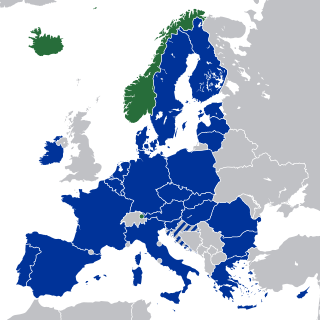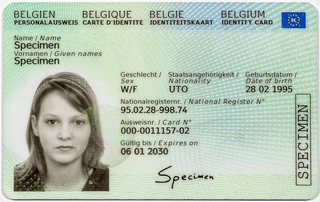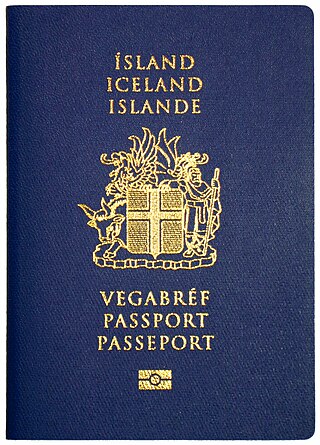
The European Free Trade Association (EFTA) is a regional trade organization and free trade area consisting of four European states: Iceland, Liechtenstein, Norway and Switzerland. The organization operates in parallel with the European Union (EU), and all four member states participate in the European Single Market and are part of the Schengen Area. They are not, however, party to the European Union Customs Union.

The European Economic Area (EEA) was established via the Agreement on the European Economic Area, an international agreement which enables the extension of the European Union's single market to member states of the European Free Trade Association. The EEA links the EU member states and three of the four EFTA states into an internal market governed by the same basic rules. These rules aim to enable free movement of persons, goods, services, and capital within the European single market, including the freedom to choose residence in any country within this area. The EEA was established on 1 January 1994 upon entry into force of the EEA Agreement. The contracting parties are the EU, its member states, and Iceland, Liechtenstein, and Norway. New members of EFTA would not automatically become party to the EEA Agreement, as each EFTA State decides on its own whether it applies to be party to the EEA Agreement or not. According to Article 128 of the EEA Agreement, "any European State becoming a member of the Community shall, and the Swiss Confederation or any European State becoming a member of EFTA may, apply to become a party to this Agreement. It shall address its application to the EEA Council." EFTA does not envisage political integration. It does not issue legislation, nor does it establish a customs union. Schengen is not a part of the EEA Agreement. However, all of the four EFTA States participate in Schengen and Dublin through bilateral agreements. They all apply the provisions of the relevant Acquis.

The European Health Insurance Card (EHIC) is issued free of charge and allows anyone who is insured by or covered by a statutory social security scheme of the EEA countries, Switzerland, and the United Kingdom to receive medical treatment in another member state in the same way as residents of that state—i.e., free or at a reduced cost—if treatment becomes necessary during their visit, or if they have a chronic pre-existing condition which requires care such as kidney dialysis. The term of validity of the card varies according to the issuing country. Continued reciprocal healthcare access between the EU and the UK was agreed, and the UK issues a UK Global Health Insurance Card (GHIC) valid in the EU, but not other EEA countries.

The EFTA Court is a supranational judicial body responsible for the three EFTA members who are also members of the European Economic Area (EEA): Iceland, Liechtenstein and Norway.

The EFTA Surveillance Authority (ESA) monitors compliance with the Agreement on the European Economic Area (EEA) in Iceland, Liechtenstein and Norway (the EEA EFTA States). ESA operates independently of the States and safeguards the rights of individuals and undertakings under the EEA Agreement, ensuring free movement, fair competition, and control of state aid.

The national identity cards are identity documents issued to citizens of nations in the European Union (EU) and European Free Trade Association (EFTA) member states, with the exception of Denmark and Ireland. The identity cards have been harmonized as a new common identity card model replaced the various formats in use on 2 August 2021.

The Norwegian identity card, commonly referred to as the national identity card in Norway, is a non-compulsory biometric identity document issued since 30 November 2020. It is one of two official identity documents issued by the Norwegian Police Service, the other being the Norwegian passport. It is only issued to Norwegian citizens, and may indicate citizenship so that it can be used as a travel document facilitating freedom of movement within the European Free Trade Association and the European Economic Area. For travel within the Nordic countries no identity documentation is legally required for Nordic citizens due to the Nordic Passport Union.

The European Union Act 2017 was an Act of the Parliament of the United Kingdom to empower the Prime Minister to give to the Council of the European Union the formal notice – required by Article 50 of the Treaty on European Union – for starting negotiations for the United Kingdom's withdrawal from the European Union. It was passed following the result of the 2016 United Kingdom European Union membership referendum held on 23 June in which 51.9% of voters voted to leave the European Union.

Between 2017 and 2019, representatives of the United Kingdom and the European Union negotiated the terms of Brexit, the UK's planned withdrawal from membership of the EU. These negotiations arose following the decision of the Parliament of the United Kingdom to invoke Article 50 of the Treaty on European Union, following the UK's EU membership referendum on 23 June 2016.

The United Kingdom's post-Brexit relationship with the European Union and its members is governed by the Brexit withdrawal agreement and the EU–UK Trade and Cooperation Agreement. The latter was negotiated in 2020 and has applied since January 2021.

The United Kingdom (UK) was a member of the European Economic Area (EEA) from 1 January 1994 to 31 December 2020, following the coming into force of the 1992 EEA Agreement. Membership of the EEA is a consequence of membership of the European Union (EU). The UK ceased to be a Contracting Party to the EEA Agreement after its withdrawal from the EU on 31 January 2020, as it was a member of the EEA by virtue of its EU membership, but retained EEA rights during the Brexit transition period, based on Article 126 of the withdrawal agreement between the EU and the UK. During the transition period, which ended on 31 December 2020, the UK and EU negotiated their future relationship.

Passports of the EFTA member states are passports issued by the European Free Trade Association (EFTA) member states Iceland, Liechtenstein, Norway and Switzerland. EFTA is in this article used as a common name for these countries.

The impact of Brexit on the Irish border and its adjacent polities involves changes in trade, customs, immigration checks, local economies, services, recognition of qualifications, medical cooperation, and other matters, now that it is the only land border between the United Kingdom and the European Union.

The Brexit withdrawal agreement, officially titled Agreement on the withdrawal of the United Kingdom of Great Britain and Northern Ireland from the European Union and the European Atomic Energy Community, is a treaty between the European Union (EU), Euratom, and the United Kingdom (UK), signed on 24 January 2020, setting the terms of the withdrawal of the UK from the EU and Euratom. The text of the treaty was published on 17 October 2019, and is a renegotiated version of an agreement published half a year earlier. The earlier version of the withdrawal agreement was rejected by the House of Commons on three occasions, leading to the resignation of Theresa May as Prime Minister and the appointment of Boris Johnson as the new prime minister on 24 July 2019.
In British politics, the "Norway-plus model" was a proposal for a post-Brexit settlement, which the British government did not pursue. Proposed in November 2018 as an alternative to the Chequers plan, it would have consisted of membership of the European Free Trade Association (EFTA) and of membership of the European Economic Area (EEA) as an EFTA member state, combined with a separate customs union with the EU to create a trade relationship similar to that between the EU and its member states today, with the exception of the political representation in the EU's bodies. Michel Barnier, the EU's Chief Negotiator, has always said that a model that combined EEA/EFTA and a customs union was one that he would be happy to consider.

A no-deal Brexit was the potential withdrawal of the United Kingdom (UK) from the European Union (EU) without a withdrawal agreement. Under Article 50 of the Maastricht Treaty, the Treaties of the European Union would have ceased to apply once a withdrawal agreement was ratified or if the two years had passed since a member state had indicated its will to leave the European Union. The two-year period could have been extended by unanimous consent from all member states, including the member state that was wishing to leave the European Union.

This article outlines the predicted impact of Brexit, the withdrawal of the United Kingdom (UK) from the European Union (EU) and the European Atomic Energy Community.
In the wake of the referendum held in the United Kingdom on 23 June 2016, many new pieces of Brexit-related jargon entered popular use.
The European Union Settlement Scheme is an immigration regime of the United Kingdom introduced by the Home Office in 2019, under the new Appendix EU of the UK's Immigration Rules, in response to the Brexit situation. EUSS processes the registration of nationals of EU and EFTA countries who were resident in the United Kingdom prior to the end of the Brexit transition/implementation period at 11pm GMT on 31 December 2020. Successful applicants receive either 'pre-settled status' or 'settled status', generally depending on the length of time they have been resident in the United Kingdom.

The UK Global Health Insurance Card (GHIC) is a card issued by the NHS Business Services Authority on behalf of the Department for Health and Social Care in the United Kingdom. It is issued free of charge to anyone covered by the social security system of the United Kingdom and provides evidence of entitlement to the provision of healthcare services under the UK's reciprocal healthcare agreements with the European Union, Switzerland, Norway, Iceland, Liechtenstein, Montenegro, Guernsey and some British Overseas Territories. It is also accepted by Australia as proof of eligibility to enrol in Medicare.














